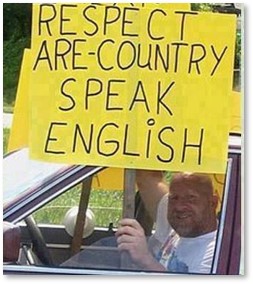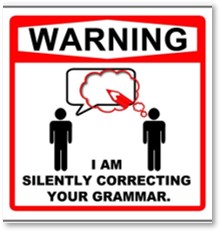More and more I hear Americans displaying their ignorance, during news interviews, in articles they write, and in things I hear others say. I find it dismaying. I’m an English major, a published author, and a fairly intelligent person who lives in the state that consistently ranks at the top of our country’s “most educated” states. If that makes me an elitist or a snob, so be it. I embrace it.
Just Can’t Suffer Fools
 These days it seems I must suffer fools but I do not do so gladly. The ignorance to which I refer infects three main areas:
These days it seems I must suffer fools but I do not do so gladly. The ignorance to which I refer infects three main areas:
- The English Language
- American History
- Civics
Alright, it probably occurs in many other areas but these three categories are the ones where I see and hear it the most. I was going to deal with all three in this post but, as usual, I found more than enough material for three posts. Today, I’m focusing on the language American speak every day—for better or worse.
Learning Proper English
 English is a pretty complex language but we start learning it in our mothers’ laps and by our fathers’ knees. If Mom and Dad don’t get it right, school is supposed to correct mistakes and teach you proper usage.
English is a pretty complex language but we start learning it in our mothers’ laps and by our fathers’ knees. If Mom and Dad don’t get it right, school is supposed to correct mistakes and teach you proper usage.
I attended parochial elementary school, where the nuns had rulers and knew how to use them. They didn’t call it “grammar school” for nothing.
From what I have observed, however, that educational correction frequently does not happen
Egregious English Errors
How else does one explain the difficulty so many American have in speaking correct English? Some of the egregious errors that make the hair stand up on the back of my neck (and I’m far from alone) include:
- “I seen her do it” instead of “I saw her do it.”
- “Me and him went hunting,” instead of “He and I went hunting.”
- “Her and I have the same sweater,” instead of “She and I have the same sweater.”
- “A team of doctors are available,” instead of “a team of doctors is available.”
- “I should of went right away,” instead of “I should have gone right away.”
- “They divided the vaccine between 50 states,” instead of “They divided the vaccine among 50 states.”
- “That’s a mute point,” instead of “That’s a moot point.”
- “I should have went with you,” instead of “I should have gone with you.”
We have the ever-present mis-use of to-too-two and your-you’re, Egregious mis-spellings. The confusion of “are” and “our.” The inability to use apostrophes properly, particularly with plural nouns. The complete confusion about what constitutes the subject of a sentence and how to match it with the correct verb when there is an intervening prepositional phrase. It goes on and on. I did not make this up; just look at the pictures.
A Great Irony
The great irony here is that the very people who demand all immigrants learn to speak English are often the same folks who mangle it themselves. I doubt if anyone in those pictures is an immigrant. Should I assume that all these Americans cut English class or didn’t even have an English class?
 Or are they so surrounded by people who can’t speak with proper grammar that they adopt the vernacular of their region or neighborhood as protective coloration? This happens in Black cultures, for example, where they might reject using Standard English as “talking white.”
Or are they so surrounded by people who can’t speak with proper grammar that they adopt the vernacular of their region or neighborhood as protective coloration? This happens in Black cultures, for example, where they might reject using Standard English as “talking white.”
Here in Boston, we use “wicked” in ways that no one else in the country would understand. (It means “very” as in “wicked good movie” or “wicked strong coffee.”) We think it’s funny and aren’t afraid to laugh at ourselves. But no one teaches it as proper English.
Two Views on Education
While I hesitate to inject politics into this discussion, I’m aware that the Red and Blue camps account differently for the sad state of American English. Conservatives often blame teachers’ unions that protect bad teachers and keep them from being fired. Progressives blame states that refuse to tax residents sufficiently to fund the school systems. The book “Dying of Whiteness” by Jonathan Metzel has an excellent discussion of this, using the Kansas Experiment as an example.
And then we have poor states and cities with sluggish economies that simply don’t have enough money to run good school systems. I think of the little boy in Barbara Kingsolver’s novel “Flight Behavior,” who learns English from the football coach because the school can’t afford both and who buys an outdated set of encyclopedia volumes for a buck just so he can learn something.
We have all read about inner city schools that lack enough textbooks for the whole class. Almost any teacher regardless of location can testify that he/she spends their own money on needed supplies and classroom materials.
Your Worst Nightmare
Whatever the reason, I think that far too many Americans either never learned to speak proper English or prefer not to do so. For those of us who paid attention in class, who were English majors, who write for a living, who NOTICE when the people around us speak or write incorrectly, this is a sad and annoying state of affairs.
 We are the people who whisper the correct word or phrase under our breath, who surreptitiously correct misspellings on signs and menus, who write letters to the editor or comment on articles that demonstrate bad usage. We are also the people who form mental judgments about you based on your English usage.
We are the people who whisper the correct word or phrase under our breath, who surreptitiously correct misspellings on signs and menus, who write letters to the editor or comment on articles that demonstrate bad usage. We are also the people who form mental judgments about you based on your English usage.
If you don’t care about the language of your own country, we are your worst nightmare.
You know that we know. And you don’t like it. It makes you uncomfortable. Good. Pay attention and perhaps you will learn to speak correct English, too.


I am 80 years old and I quit school in the 10th grade to go to work. Over my lifetime I owned several businesses. I also became a professional pilot and flight instructor, a wedding consultant and planner, as well as being senior minister at a church for 15 years. There is no reason to remain ignorant due to the lack of formal education. I think people today just don’t care. I worked hard on self education through reading and the internet. I am very concerned about the future of this country when the citizens are so ignorant, and worse, don’t care.
I’m shocked at how many African and white Americans can’t speak English properly. I see it everyday, I hear it every day: the inability to conjugate to verb I am, the verb to see, etc. I understand Hispanics having a difficult time si ply because they may have only been here a decade or more, but for those A,Erica still who have been living here for decades, it’s blisteringly frightening. I cannot understand how a college graduate doesn’t understand the difference between conscience and consciousness.
And then there are those individuals who would like to “impress” us with their language skills, when it is clear they cannot speak English, whatsoever. The latter is sad because it is often black men who do this, trying to appear smarter than they are.
I think the US should teach English as the national language, in an attempt to improve literacy rates in America. As a young chef, I often see people applying for chef’s positions when they spelled the word chef “chief”. I love language, and literature, and we need to make more of an effort in schools to teach English so that we can teach the “basics”.
Americans speak best English just you foreigners don’t know speak it properly. Perhaps go to school learn proper English stop judging us filthy foreigners,
*every day
I am not an English major, and I make mistakes on occasion, but I always try to speak and write correctly. In the example “A team of doctors”, I would think that if the focus was upon “the team” as a singular unit, then I would use “is”. If it was upon the doctors, I would use “are”.
In your example, Matison, the subject is “team” and “doctors” is the object of a prepositional phrase. The proper verb is, therefore, is singular and would be “is.” The focus does not trump sentence structure.
The past participle is dead. It has been replaced by the simple past. I have ate. They have went. She has rode. It makes my hair stand on end.
Another issue is in IF sentences. If I would have known, I would have gone with you!!! I never hear HAD used in these sentences…never! Of course, it should be: If I HAD known, I would have gone with you.
And a third grammar issue that grates on the nerves is the misuse of HAD. ‘He went to the store and then had bought the candy.’ Confusing! Anything with HAD precedes in time the rest of the action.
Robin: I agree on all counts. I practice almost daily what I call simultaneous translation: changing incorrect grammar to its correct form in my head. What doe they teach in English class these days?
You forgot about the usage of “tooken”.
I struggle to watch even scripted shows on TV because the writers do not know proper English. Most shows on TV have no sign of proper English.
I have decided that high schools should require an English exam in the junior year to decide if students should even be allowed to graduate. That way, they would still have senior year to learn elementary school English. No one should be allowed to graduate high school or even get a GED unless they can speak the country’s language.
Good blog post. Improper English usage, especially in the young who do not get corrected by their families at home, is a sad way to handicap the lives of those in grades 1 through 12.
We hear the errors and recognize the loss of chances at rising in society. It bugs the heck out of me.
And even worse, the kids who get through college, who are on TV and can’t speak proper English!!
One that drives me up the wall is the interchangeability usage of the non-interchangeable “imply” and “infer”.
I am an American who lives in the UK and I regret to inform you that the following is considered correct by the English:
Me and X did Y
X and I did Y seems to have died out. It grates on my nerves, as do all of your other examples. I shake my head in sorrow over the state of the English language in the USA. And sometimes here in the UK as well.
We tolerate shoddiness in our culture and in our literature, e.g., what passes for many modern books is abominable, and poor speech in our entertainment but then express surprise at the lack of proper English use?
My personal teeth-grinder is “I could care less!” ARGH! Of course I am not pristine saint in this either, but my both-doctorates parents worked with me for years to improve my writing.
In my family my wife’s native language is not English, and she still sticks to many of her native speech patterns. She’s done an amazing job in learning English so I can’t fault her for that, but still the “old ways” carry over.
Speaking of schools, there’s an excellent chapter in Thomas Sowell’s “Black Rednecks and White Liberals” that discusses schools, particularly as related to black education. The entire book was one relentless education after another on multiple topics. His chapter on slavery in the world, and the role America and England played in squashing it, was phenomenal. (As was, actually, the titular chapter discussing how the “redneck culture” actually came from the Scottish Highlands and, as those immigrants mingled with blacks in the south, transferred to them.)
Walter E. Williams also has many essays on black education in his book that he sent me, “American Contempt for Liberty.”
I can’t believe anyone would praise an Uncle Tom like Sowell. This a man who claims slavery was the best thing that ever happened to the African people. He is a disgusting excuse for a human being, a traitor to his own people who got rich and famous selling them out. The White European race colonized and enslaved most of the known world, slaughtered millions of innocent people, and had the nerve to claim they gave them civilization and Jesus. By the way, I am, infortunately, of English heritage.